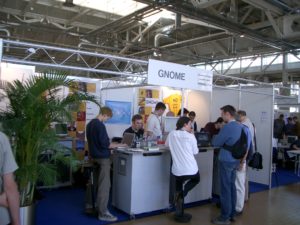All the Gaps in Germany will be gone in a couple of weeks. I guess it's time I broke my dependence anyway. But not before feeding the addiction at closing-down prices at the Munich shop.
Gabber is dead
Julian Missig has decided to stop work on gabber, because he has a crashing bug. He believes that there is a change in memory management policy between gtkmm 2.2 and gtkmm 2.4. There isn't, and if there seems to be then it's a bug that I'd gladly fix. I've told him about 4 times now that there is no such change of policy, but he doesn't want to hear that answer. I've recommended valgrind to help with memory management issues. I think he calls it a change of "windowing" or something like that, though I'm not sure what that means. He refuses to create a test case to either debug his own code or to show a bug in gtkmm. This is silly and I object to the disinformation – if there is not a test case in bugzilla then it's not a proven bug, and I don't lie about what architectural changes I have made.
People need to create tests cases because library maintainers will not debug peoples' applications for them. Most people have no problem with that. I note also that I have a good record of fixing bugs shown by such test cases.
Go gossip
Infectious gypsies
After so many people had recommended it to me, I finally got around to watching Black Cat, White Cat. It's wonderfully entertaining and imaginative, though I'm afraid many Romas probably find it highly offensive. For several days after watching it, I found myself doing little dances to the music. Now I want to watch all of Emir Kusturica's other films too.
LinuxTag 2004
I spent Friday and Saturday at LinuxTag in Karlsruhe, helping out a little at the GNOME stand. LinuxTag is much better than I expected. Somehow I always thought it would be just an expo, with a bunch of boring corporate stands. But there’s a great sense of activity and community, and there’s heaps of high-quality talks all day, every day. I’ll be at the next one. By the time I left, I had almost completely lost my voice, and I’m still mostly mute.
However, the people there are quite a bit more geeky than at GUADEC. Nobody at GUADEC would ask Michael Meeks about easy ways to build GNOME on LFS without hearing “I want it to be difficult. How can you make that easier?”. There were also very many SUSE users who had never even seen a GNOME desktop before, which explained their misconceptions.
It was great to meet lots of the German GNOME community for the first time, such as Sven Herzberg, Matthias Warkus, and the GPE developers. And it’s always good to meet Daniel Elstner and Frank Rehberger again. Michael Meeks asked everyone to hack on Mono, including me – I don’t think he knows who I am.
Distros need community, distros need schedules
I am disappointed. Fedora has a sane time-based release schedule, but does not seem any closer to allowing community involvement. Debian has great community involvement but seems even further away from having a time-based release schedule, or even a release. Allowing either of these problems to go unfixed means eventual demise for a mass-market consumer distro.
Red Hat's merger with the fedora.us packaging community to make the Fedora distro seems to have actually made things worse. Before the merger, we saw the start of a single authorative community-based source for 3rd party packages, allowing people to actually install software that is not on the Red Hat disks. There needs to be one and only one source of such RPMs, or everthing forks at the first commonly-used 3rd-party library RPM, and quality control becomes impossible. But now fedora.us is no longer that community, because Fedora say that they are that community, except they are not. If Fedora don't fix it soon then they need to publically endorse fedora.us again so they can get the job done.
Most debian users use either testing or unstable, neither of which is suitable for regular users, and which are actually too fragile for most advanced users. The stable distribution is so old (GNOME 1.4) that it is also useless to regular users. There is no scheduled date for a new debian stable release, and no rush to make it happen according to any concept of feature/quality completion, because there is no scheduled date. Debian is a perfect example of how "soon" turns into "almost never". "soon" is never as good as an actual schedule.
Raus
Openismus
As I mentioned a while ago, I wanted to have some kind of company name to put on my freelancing work, so that it could become known, and so that I could build it over the years. I finally thought of a name, though I’m not ready to found a full company yet. I have moved various articles from murrayc.com to the new website.
Openismus is not yet a proper company. In terms of German law, it is an Existenz, no different than how I worked before. If all goes well then it might become a Firma next year. Compared to the UK, it’s quite difficult to found a company in Germany, though it is far easier to work without a company.
I spent an insane amount of time creating that simple web site with CSS. I needed a couple of hacks to make it work on Mozilla, and a couple of even stranger ones on Windows. Every time I thought I had fixed it, I would try it on the other platform and find that either the position, height, or width of a box had gone loony. I am really starting to think that CSS positioning is a waste of time unless you want fixed positions. I don’t know if the problem is the CSS specification, but it’s obvious that no browsers seem capable of implementing the specification, and they are all broken in different ways.
Freedom of movement
I was offerered a project in Berlin which I decided to take if all goes well. It's a long way from Munich but it's a) better than Linz, and b) could fund some of my other plans. Munich would still be my home though.
And it looks like I might spend a year in Romania from the middle of 2005. That would be an adventure.
Ignoring the awkwards
I was reading an article about London's mayor, Ken Livingston, in the Economist last week. It reminded me of the attitude that an open source maintainer must often have. Livingstone believed that people do not need to drive their cars in central London, and that a) the majority of people should not have to suffer just because a minority do not understand that, and b) that loony minority will pay for the luxury if it's so important to them. He knew that once you clear the roads of all that empty metal then you can improve public transport, and thus remove the need to drive in the first place. There was a lot of opposition to the congestion charge, but Livingston knew that he was right and did not believe that the loudest voices were the most representative. I visited London a few months ago and the streets were noticeably calmer, with just commercial vehicles to be seen. Ken Livingston just got re-elected.
Likewise, in GNOME, maintainers sometimes have to ignore people who think they are shouting on behalf of the majority, because the maintainers know that they do not, and because the maintainers have actually thought things through.
European elections/constitution
The election results were depressing but it's not surprising that people voted in the european elections according to their national issues. After all, it was the national parties that were offering themselves for election, and they didn't offer any substantial policies for Europe, or even communicate what their role as MEPs is. To have meaningful European elections, I think these things are necessary:
- MEPs should campaign as members of European political parties, and those political parties should have Europe-wide manifestos. These political parties would then be able to tout their ability to counter the power of petty national politicans, to improve the lives of European citizens. National political parties could do the same. Checks and balances are good. Note: UK voters should be glad that the European electoral system allows 20% of them to vote for the UKIP, whereas the UK electoral system would not allow them a single seat in government.
- A directly-elected European president could clearly embody the policies and activities of the European Union.
- The laws against free trade in European communications/broadcasting must be lifted, so people can get non-National news sources. This would allow the creation of Europe-wide TV stations as well as access to the TV stations of other nations.
- The new constitution should be celebrated for simplifying European laws and institutions, and therefore dealing with the main anti-EU complaints. It's still not a very good document, but European politicians should offer to improve it incrementally.
- States should be allowed to leave. Most attempts to leave the EU would fail to get support in a referendum, and that would settle the issue for a while. States that do vote to leave should be allowed to suffer the consequences, and demonstrate the advantages of being in the EU.
- There should be an official two-speed EU, so that states can have the amount of federalism that they want, without forcing anyone else to go as slow or as fast. The others can catch up when they are ready after the way has been shown. We already have something like this with Euro currency area.
The Wahlomat says that I lean towards the Greens, though I happen to think that genetically modified foods are rather nifty.
None of the parties' positions inspired me. I think they should be offering to improve the lives of individual Europeans, by giving them more freedom, and they should celebrate how they have already done that. Most national governments don't have the support of half of their populations. Many countries such as Britain have terrible problems that affect everyday quality of life, but seem incapable of fixing them regardless of who is in power. But Europe has given people the freedom to go where the grass is greener, either physically, or just to do business. Europe should improve access even more, and ask for a mandate to do it:
- The tax system should be unified. Each country has insanely-complicated tax systems that even accountants don't understand. Doing business is therefore expensive and risky. Doing business across European borders becomes exponentially difficult. Even if we don't have exactly the same tax system everywhere, I see no reason why we can't have tax structure across Europe, just with separate percentages at the various levels, and a clear list of national exceptions if necessary. They could start with income tax, and fix the other taxes later.
- There must be one official language across Europe. I don't mean that everyone should be forced to speak English, but every government's beaurocratic documents should be in both the local language(s) and English. Beaurocrats should be required to speak English as well as one of the other national languages. Europe should encourage bilingualism in schools and media (see free trade in broadcasting above).
I was particularly disgusted by the populist policies of the CSU (Bavarian CDU) in Germany – firstly that Turkey must never be in the EU (with no real justification, leaving us to assume that they simply don't like their race and creed), and that the EU constitution must state that the EU is christian. They did not make clear what they would do with those of us who are not christian, but it's clear that they don't want a diverse Europe. I'm surprised that these racial and religous policies are not actually illegal. Members of the same party have recently been saying that ethnically-german women should have more german children, while simultaneously fighting immigration that would fix the demographics a lot more quickly. And the same people often fight against the right of German citizens to have their own mosques, though I fail to see how that's different to banning synagogues. Meanwhile, in the UK, 1 in 20 people voted for the British nazis.


